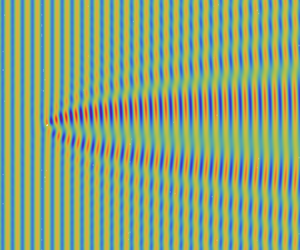No CrossRef data available.
Article contents
Sound scattering by a vortex: case of exponentially decaying velocity
Published online by Cambridge University Press: 19 May 2021
Abstract

The well-known two-dimensional problem of a plane acoustic wave scattering by a point vortex is ill-posed because the vortex velocity field decays as  $r^{-1}$ at infinity. We show that for problem to be well-posed, the velocity field must decay more rapidly than as
$r^{-1}$ at infinity. We show that for problem to be well-posed, the velocity field must decay more rapidly than as  $r^{-3/2}$. We propose a reformulation where the point vortex is screened by a vortical mantle with the opposite total circulation such that the velocity field is proportional to
$r^{-3/2}$. We propose a reformulation where the point vortex is screened by a vortical mantle with the opposite total circulation such that the velocity field is proportional to  $r^{-1} \exp (-r^2 / L^2)$. The vortex effective radius
$r^{-1} \exp (-r^2 / L^2)$. The vortex effective radius  $L$ is assumed long compared with the acoustic wavelength
$L$ is assumed long compared with the acoustic wavelength  $\lambda$. In the Born approximation, the scattered field is the solution to the inhomogeneous Helmholtz equation with the Sommerfeld radiation condition that can be represented as convolution of the source term with Green's function. The asymptotic evaluation as
$\lambda$. In the Born approximation, the scattered field is the solution to the inhomogeneous Helmholtz equation with the Sommerfeld radiation condition that can be represented as convolution of the source term with Green's function. The asymptotic evaluation as  $\lambda / L \to 0$ shows the analogy to plane-wave diffraction by a slit of width
$\lambda / L \to 0$ shows the analogy to plane-wave diffraction by a slit of width  $L$. In the Fraunhofer region
$L$. In the Fraunhofer region  $r \gg L^2 / \lambda$, the solution is an outgoing cylindrical wave that peaks at small scattering angles
$r \gg L^2 / \lambda$, the solution is an outgoing cylindrical wave that peaks at small scattering angles  $\theta = O(\lambda / L)$ and matches the expression with a singularity on
$\theta = O(\lambda / L)$ and matches the expression with a singularity on  $\theta = 0$ known from the case of the point vortex (Pitaevskii, Sov. Phys. JETP, vol. 8, 1959, pp. 888–890) as
$\theta = 0$ known from the case of the point vortex (Pitaevskii, Sov. Phys. JETP, vol. 8, 1959, pp. 888–890) as  $\theta \gg \lambda / L$. In a part of the region of geometrical acoustics
$\theta \gg \lambda / L$. In a part of the region of geometrical acoustics  $r \ll L^2 / \lambda$ including the region
$r \ll L^2 / \lambda$ including the region  $r \ll L$ where the vortex velocity field is proportional to
$r \ll L$ where the vortex velocity field is proportional to  $r^{-1}$, the solution matches the second known expression (Sakov, Acoust. Phys., vol. 39, 1993, pp. 280–282) that does not decay at infinity. The results are confirmed by numerical integration.
$r^{-1}$, the solution matches the second known expression (Sakov, Acoust. Phys., vol. 39, 1993, pp. 280–282) that does not decay at infinity. The results are confirmed by numerical integration.
JFM classification
- Type
- JFM Papers
- Information
- Copyright
- © The Author(s), 2021. Published by Cambridge University Press



